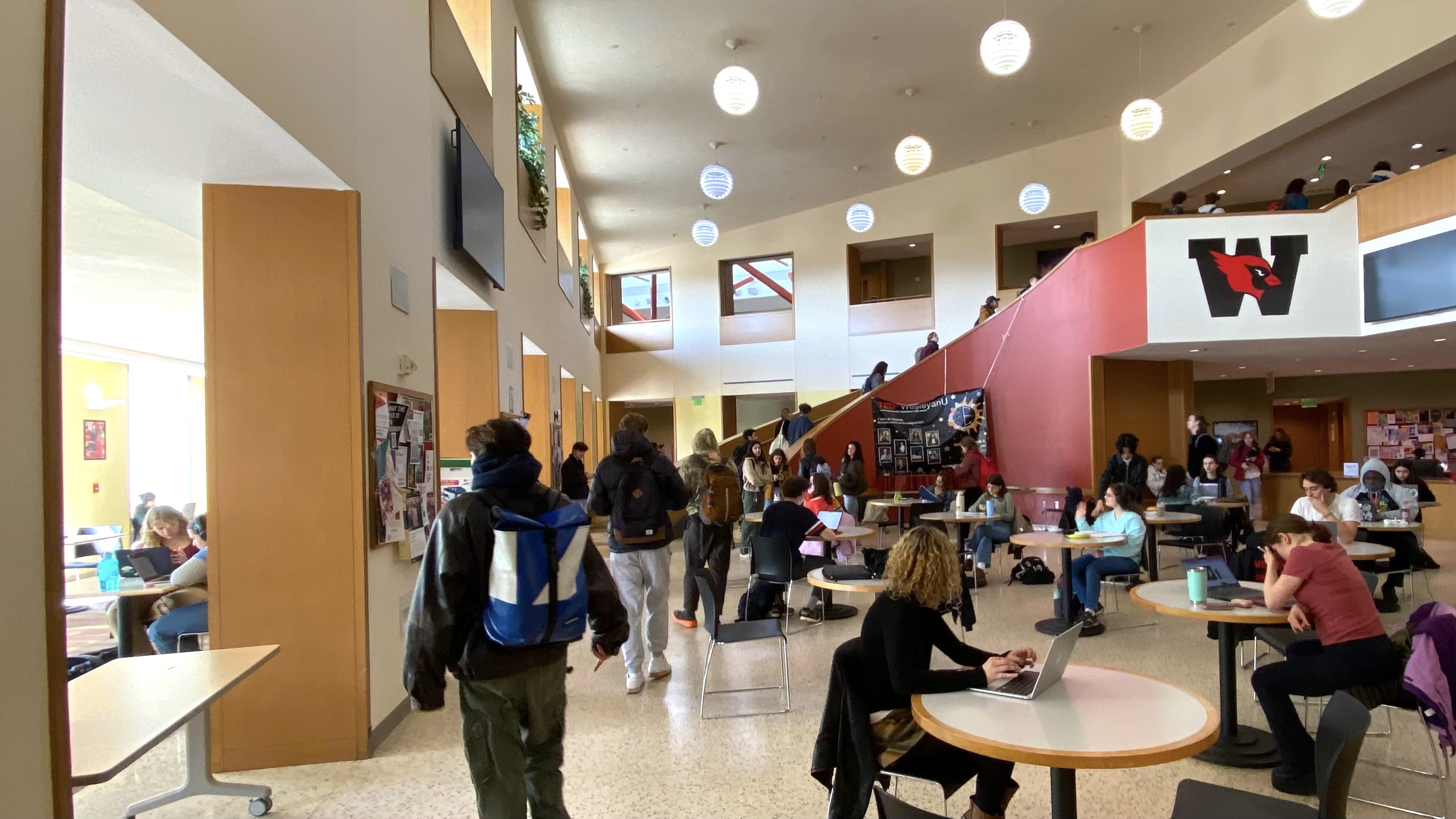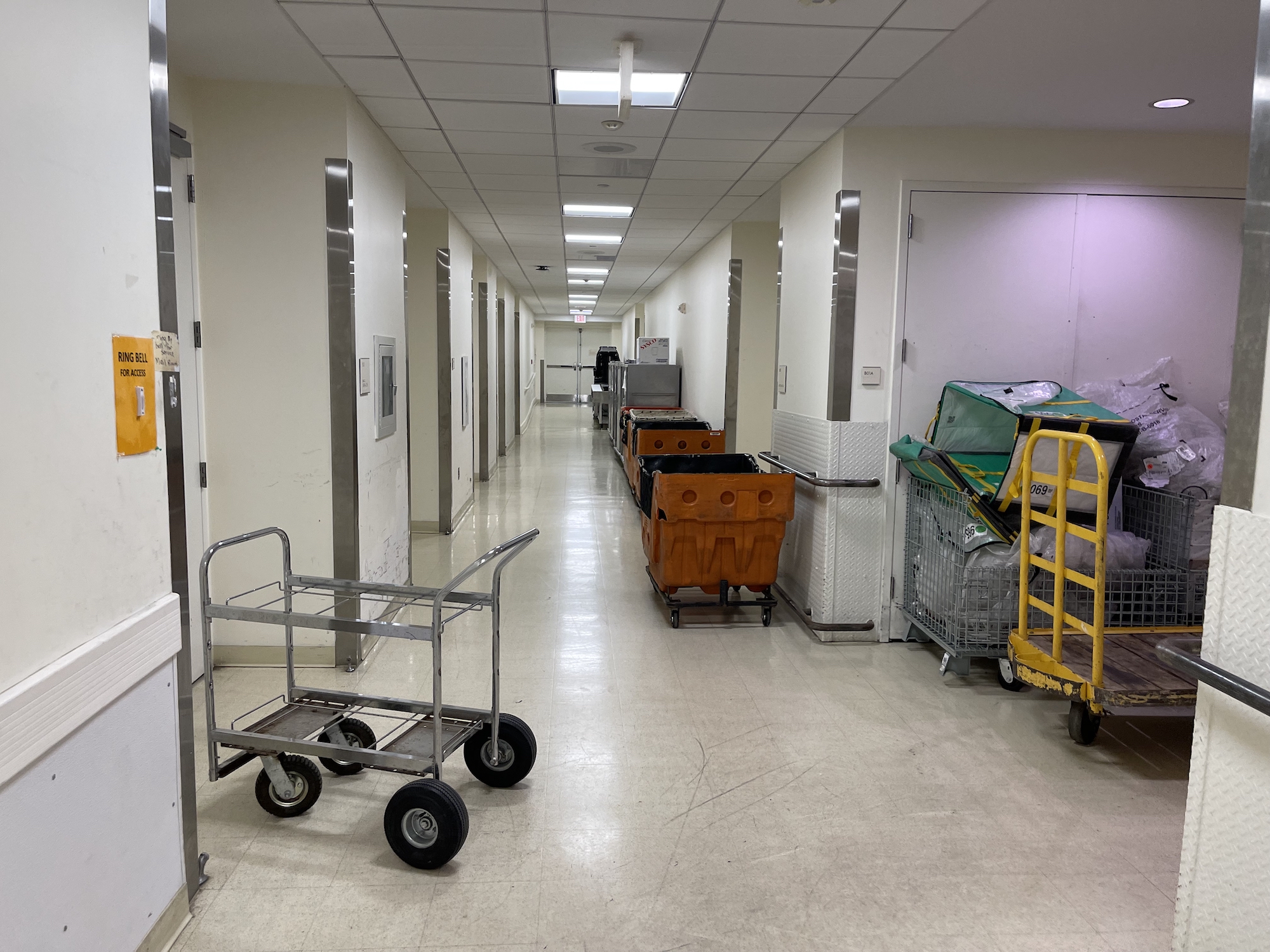
A sanitary waste pipe cracked in the Usdan University Center on Wednesday, March 1, leading to the temporary closure of all the bathrooms and water fountains in the building, in addition to Usdan Café. As a result of the unforeseen circumstances, Usdan Marketplace served only to-go dinner with limited options that evening, sending many students flocking to the Summerfields (Summies) and WesWings (’Swings).
Director of Auxiliary Services Michelle Myers-Brown first announced the problem in a campus-wide email, sent around 4 p.m. on March 1.
“Usdan is experiencing a water emergency at this time,” Myers-Brown wrote. “The building is open but services are limited.”
Assistant Vice President for Facilities Operations Luigi Marcone explained that the water in the building was shut off to avoid any additional damage. He also elaborated on Physical Plant’s response.
“In order to prevent secondary damage, we worked with the Usdan staff to restrict access to restrooms and other discharge points,” Marcone wrote in an email to The Argus. “Kitchen operations were obviously impacted by the damaged pipe, resulting in a temporary closure of the lower level prep kitchen. Staff plumbers and maintainers were able to identify the point of the leak, secure the leak temporarily and are currently making plans to schedule permanent repairs over spring break.”
Marcone added that Facilities Operations plans to further investigate the source of issue during the spring break repairs.
“When the section of damaged pipe is removed, we plan to have a metallurgical assessment of the pipe conducted to see if we can determine the failure point,” Marcone wrote. “My apologies for any inconvenience this unforeseen failure may have caused to the student body. Please know that all mechanical systems fail at some point in time and unfortunately a sanitary line located above the finish ceiling is not something that would be subject to preventative inspections or maintenance.”
Operations Coordinator of Auxiliary Services Anthony Frosolone explained that this is the third pipe-related issue that Usdan, which first opened its doors in the fall of 2007 , has experienced this semester.
“First we had a compactor pipe in [Room] 136, which is our conference room here on the first floor,” Frosolone said. “We had a pipe in the steel pan room that was from the sprinkler system. All unrelated, separate things. [The steel pan room pipe,] that’s been repaired here and they’re cleaning all that up. That was last week. Three weeks ago was the one on [the first] floor, in the conference room. And then the pipe [on March 1] was in the Bon Appétit kitchen in the basement.”
Frosolone also elaborated on the extent of the damages caused by the previous two pipe incidents.
“The wall needed to be ripped out, the carpet needed to be replaced in the conference room,” Frosolone said. “In the steel pan room, the pipe needed to be replaced and the wall needed to be repaired. The floor had water. So that had to be mitigated. Downstairs, they are cleaning and sanitizing in the kitchen. So we’re working on all of that.”
Marcone explained that Physical Plant intends to look at the three incidents to uncover if there is a larger problem at play.

“This is the third time that something like this has been discovered in the building and it is what I would consider a premature failure, which is why we are conducting the metallurgical assessment to help us determine if there’s a failure with the pipe or if there might be some other situation occurring,” Marcone wrote.’
The unexpected pipe issue on Wednesday forced many students who rely on the building and its services as part of their daily lives to make alternate arrangements that afternoon and evening.
“I was late to class because I couldn’t find a working bathroom,” Aidan Baldick ’25 said.
Students who originally planned to eat dinner at Usdan, a frequent dining spot for many first-years and sophomores, scrambled to make other plans. Many students chose to dine at ’Swings or Summies, causing the normal wait time for food to be longer than usual.
“Wednesdays at Swings are always packed because of salmon night, but [it] was especially busy as many students couldn’t eat at Usdan,” ’Swings student worker Miku Kimura ’26 wrote in a message to The Argus. “We typically have [five to six] student employees working each dinner shift with their own designated roles, however because of the large crowd of customers today, we had to constantly rotate responsibilities of taking orders at the register and helping inside the kitchen throughout the night.”
Nicole Schully ’25 also worked the dinner shift at ’Swings that night and hardly had a spare moment to stop and take a breath.
“I saw the email about Usdan before going into work, so I knew what I was getting myself into, and I was able to warn my boss and the employees who didn’t see or receive the email,” Schully wrote in an email to The Argus. “Most of it was fun and exciting, [but] a lot of it was stressful too. I don’t know if there was a second where there wasn’t a line, and most of the time the line was out the door.”
Out of sheer necessity, Schully, who typically works out front, spent that evening’s shift in the kitchen.
“It came to the point where we had to slow down taking orders so that the kitchen could catch up,” Schully wrote. “We also sold out of specials fast, which not only meant that we had [fewer] options, but also that everyone was condensed to one side of the kitchen. I think I made almost 40 chicken parm subs and at least 10 garden bagel melts.”
Schully also mentioned how the dinner rush shifted the usually relaxed environment of the restaurant.
“One thing I love about working at Swings is interacting with my coworkers as well as those who come in to eat,” Schully wrote. “We definitely had no time for socialization which undoubtedly affected the working environment and experience.”
Summies, too, experienced a much busier dinner shift than usual on the evening of March 1.
“On our iPad which displays the pending orders, we usually have around 10 at once, and 20 is considered ‘busy’,” Silas Bishop ’26 wrote in an email to The Argus. “[That] night, we had about 100 orders concurrently from around 6 to 7 p.m. Not only was it busier, but the high volume of orders was causing both the chefs and the student workers to mess up and some people ended up receiving orders different [from] what they wanted, or taking someone else’s order by accident. And even if their order was correct, most students were waiting around 45 minutes to get their food.”
Jeferson Lantigua ’26, another student worker at Summies, shared a similarly chaotic experience and described the environment as incredibly stressful and overwhelming.
“Because Summies was the main dining option for a lot of the underclassmen, orders were extremely backed up causing us to get orders mixed up which then decreased the quality of service we would originally be delivering,” Lantigua wrote in an email to The Argus. “Because of this, many orders that were already ready kept getting mixed up because the system kept crashing, so we apologized to those who were waiting for over 35 minutes even though the order was ready to begin with.”
With limited options and to-go dining only at the Usdan Marketplace, student workers and Bon Apétit employees made necessary adjustments to their workdays.
“Most of the cooking was already in progress and transferred to the second floor,” Myers-Brown wrote in an email to The Argus. “Modifications were made to the menu so there was no waste. Any staff [member] impacted (generally those who would have been in the main kitchen, a baker for example) was offered the opportunity to work on the second floor. I don’t have exact numbers but Marketplace did see lower numbers than usual; Summerfields, however, saw a jump in numbers.”
In a second campus-wide email sent around 8 a.m. on Thursday March 2, Myers-Brown announced the end of the Usdan pipe emergency.
“We are happy to report that repairs have been made and Usdan is running under normal operations again. Usdan Marketplace, Usdan Cafe and all other services are open for regular service.”
Sida Chu contributed reporting.
Rachel Wachman can be reached at rwachman@wesleyan.edu.


Leave a Reply